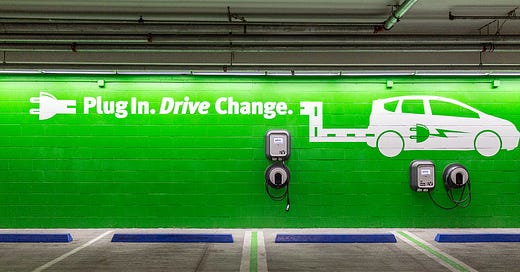Way(back): Jeff Allen on Sarah Iannarone's Transportation Piece
The case for why electric cars are key to progress on fighting climate change and promoting equity.
What is a “Way(back)”? These pieces are short reflections from contributors on previous Oregon Way pieces that left an impact on them.
Sarah Iannarone recently wrote about how the $1.2 trillion bipartisan infrastructure bill creates a major opportunity for Oregon to truly transform the state’s transportation system. She also gave a kind shout-out to the Clean and Just Transportation Network (CJTN) that Forth co-founded with Verde, Climate Solutions, and the Oregon Environmental Council. The piece generally did a nice job of outlining a positive vision for Oregon’s transportation system.
However, the piece also included an unfortunate offhand dismissal of electric cars, saying “they won’t save us” while linking to an article that actually says we must electrify to meet our climate goals. Ironically, we founded CJTN in good part to advance electrification – and to counter the all-too-common electric vehicle bashing among some transportation advocates.
This animosity to electric vehicles seems to be getting worse as they gain more attention. Some advocates in Oregon recently argued we’re paying “too much attention” to electric cars because the state will receive $52 million over five years for electric vehicle charging. That’s about 5% of the $1.2 billion in increased federal funding the state will receive for roads, bike lanes, and transit over the same period from the same bill – and it’s the first significant investment the federal government has ever made in charging infrastructure.
Let’s be clear: we must electrify everything that moves to meet our carbon goals, and doing so will mean spending a lot more. A study we recently helped complete for ODOT found we need at least 10X more charging in Oregon by 2030. Electric cars reduce carbon pollution by 60% to 80%, while completely eliminating toxic diesel exhaust and smog-forming tailpipe emissions. The Union of Concerned Scientists found that driving an electric car in Oregon equates to driving a gas car that gets about 90 MPG - if such a thing existed.
We also need electric cars to advance equity. Even in Portland, travel by car amounts to about 90% of all trips. This is especially true once you get beyond a few close-in neighborhoods. Redlining and gentrification have largely forced communities of color out of those neighborhoods, and also forced them to spend a higher percentage of their income on transportation, mostly in unreliable cars that require expensive fuel and maintenance. Commute time is the single greatest predictor of escaping poverty – and in Oregon, as in the rest of America, the fastest commute is almost always a car commute.
While we work to change that reality, we also need to acknowledge and address it. We must use electric cars (and transit buses, school buses, bikes, and scooters) to improve equitable mobility outcomes for historically underserved populations, and ensure they are not further harmed. (You can check out some examples here or a full two-day conference on the subject here.)
Building a more sustainable, efficient, and just transportation system will take a diverse range of strategies and many years of work. It will also require us to stop forming circular firing lines between different arms of the transportation reform movement, and learn to work together.
Jeff Allen is Executive Director of Forth, an Oregon-based nonprofit organization working to electrify transportation by bringing diverse stakeholders together to eliminate pollution and barriers to access.
Related pieces:
Photo credit: "Sustainability @ the OCC" by Oregon Convention Center is licensed under CC BY 2.0






